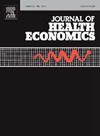Consequences of a Shortage and Rationing: Evidence from a Pediatric Vaccine
IF 3.4
2区 经济学
Q1 ECONOMICS
引用次数: 0
Abstract
Shortages and rationing are common in health care, yet we know little about the consequences. We examine an 18-month shortage of the pediatric Haemophilus Influenzae Type B (Hib) vaccine. Using insurance claims data and variation in shortage exposure across birth cohorts, we find that the shortage reduced uptake of high-value primary doses by 4 percentage points and low-value booster doses by 26 percentage points. This suggests providers largely complied with rationing recommendations. In the long-run, catch-up vaccination occurred but was incomplete: shortage-exposed cohorts were 4 percentage points less likely to have received the ir booster dose years later. We also find that the shortage and rationing caused provider switches, extra provider visits, and negative spillovers to other care.短缺和配给的后果:来自儿科疫苗的证据
本文章由计算机程序翻译,如有差异,请以英文原文为准。
求助全文
约1分钟内获得全文
求助全文
来源期刊

Journal of Health Economics
医学-卫生保健
CiteScore
6.10
自引率
2.90%
发文量
96
审稿时长
49 days
期刊介绍:
This journal seeks articles related to the economics of health and medical care. Its scope will include the following topics:
Production and supply of health services;
Demand and utilization of health services;
Financing of health services;
Determinants of health, including investments in health and risky health behaviors;
Economic consequences of ill-health;
Behavioral models of demanders, suppliers and other health care agencies;
Evaluation of policy interventions that yield economic insights;
Efficiency and distributional aspects of health policy;
and such other topics as the Editors may deem appropriate.
 求助内容:
求助内容: 应助结果提醒方式:
应助结果提醒方式:


